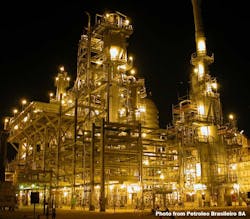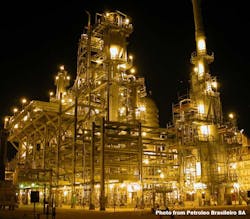Petrobras advances sale of Pasadena refinery
Petroleo Brasileiro SA (Petrobras) is moving forward with its previously announced proposal to sell subsidiary Pasadena Refining Systems Inc.’s (PRSI) refinery in Pasadena, Tex., in compliance with the Brazilian operator’s divestments portfolio and a divestment plan from Brazil’s Federal Court of Accounts, or Tribunal de Contas da Uniao (TCU) (OGJ Online, May 16, 2017).
Petrobras formally is seeking a qualified buyer for affiliate Petrobras America Inc.’s (PAI) interest in the entire Pasadena refining operations system, the sale of which includes PAI’s stake in PRSI, PRSI Trading LLC (PRST), and PRSI Real Property Holdings LLC (REAL), the company said.
Alongside the 110,000-b/d Pasadena refinery, the transaction will include sale of 5.1 million bbl of oil and products storage capacity, an associated marine terminal and logistics system, existing inventory, and land on the Houston Ship Channel usable for potential future expansion.
The proposed sale follows PAI’s determination after a comprehensive analysis that the Pasadena system does not align with Petrobras’s strategic focus but may have higher value for the right investor.
PAI has retained Evercore Group LLC, an New York-based independent investment banking advisory firm, to explore the potential sale of PRSI, PRST, and REAL with a select group of possibly interested parties, which have until before Feb. 23 to express their interest in the competitive purchase process, according to a Feb. 6 transaction teaser released by Petrobras.
Petrobras previously said the refinery’s sale aligns with its 2017-21 strategic plan, which aims to reduce the company’s operational risk and improve its overall financial performance via an expansion of partnership and divestment opportunities.
Refinery configuration
According to the latest operational data from Petrobras, the Pasadena refinery is equipped with the following unit capacities:
• Crude atmospheric distillation, 110,000 b/d.
• Vacuum distillation, 42,500 b/d.
• Fluid catalytic cracking, 52,000 b/d.
• Naphtha hydrotreating, 26,000 b/d.
• Regenerative catalytic reforming, 22,000 b/d.
• Reformate splitting, 20,000 b/d.
• Gasoline desulfurization, 40,000 b/d.
• Alkylation (two units), 6,000 b/d each.
• Distillate hydrotreating, 12,000 b/d.
Contact Robert Brelsford at [email protected].

